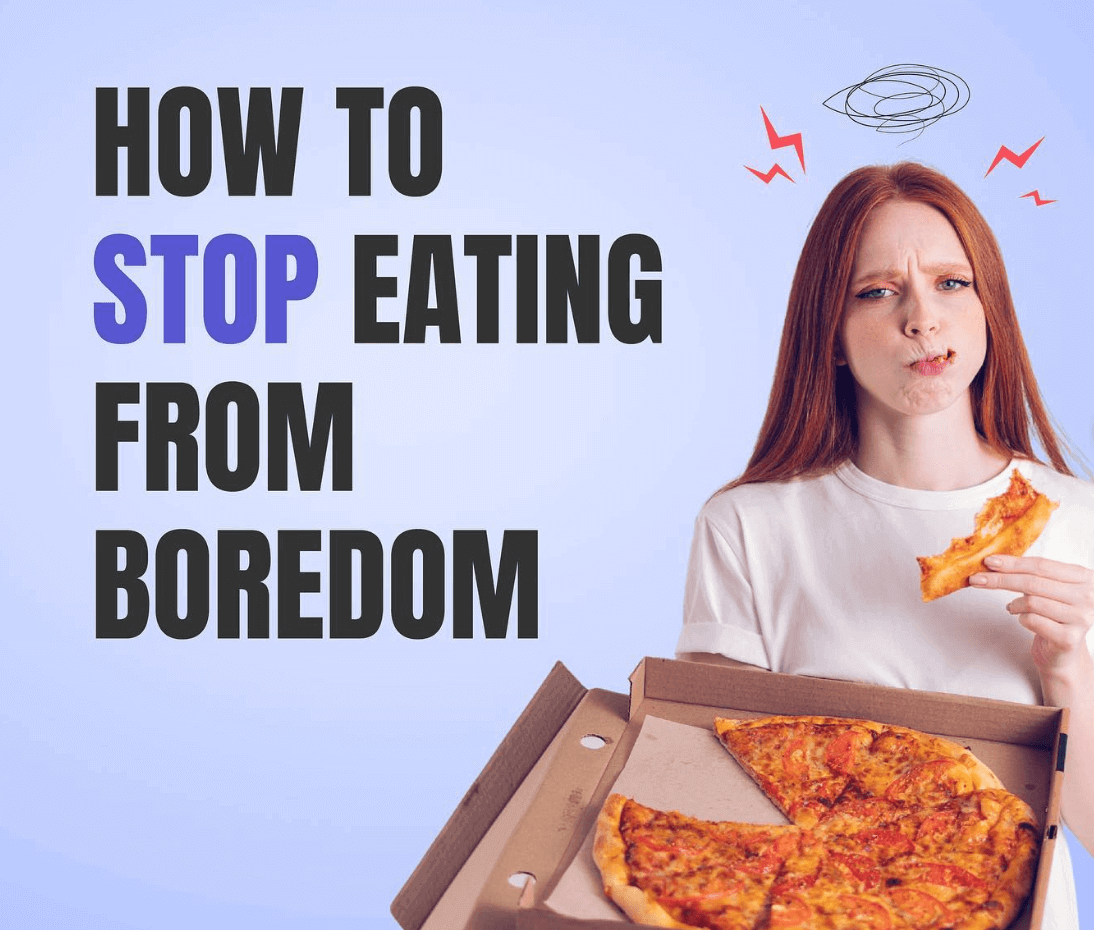IDENTIFY YOUR TRIGGERS
Identifying the triggers in your life that tend to cause the urge to eat when you’re bored is key to breaking the habit. List notes in a food journal about what you’re doing that make you feel the urge to eat so you can identify and stop boredom eating patterns.
Some common triggers to be aware of are:
stress, food availability, pictures of food
IF / THEN PLANS
Once you identify your triggers, you can plan for them and choose a preferred nourishment behaviour that does NOT involve eating.
The behaviour to change:
I eat a bag of crisps when I get stressed from work.
If/then plan:
If I get stressed out from work, then I will go out and do a 15-minute walk while listening to a podcast.
CHANGE YOUR OLD PATTERN INTO A NEW ONE
Mentally rehearse your if/then plans to make it easier to follow through with the new behaviour. Imagine 2 pathways:
PATH NO. 1 (OLD HABIT)
Sit down on the sofa, watch television and eat something salty.
PATH NO. 2 (NEW HABIT)
Sit on the sofa, watch television and drink your favourite tea or zero-calorie drink.
The new path is uncomfortable, so you’ve got to be ready to be met with resistance. However, each time you take this path, the more defined it gets, and the less resistance you will have to it.
CHANGE THE ENVIRONMENT
The same environment can cause you to become bored and overeat. However, a simple change of the surroundings may be enough to stimulate the brain and improve mood.
Have a dedicated place with no screens or other distractions so you can be aware of what you eat and when. This will help also help you to eat mindfully which can help you regulate your appetite hormones
GO OUT AND EXERCISE REGULARLY
A 2011 study suggests that vitamin D from the sunshine can reduce an afternoon slump, carbohydrate cravings, and symptoms of depression when a person combines getting outside with exercise.
PMID: 20450340
Exercise also positively affects appetite hormones, making someone less likely to overeat.
PMID: 24149873
HAVE A REGULAR EATING SCHEDULE
A 2016 study involving 11 women of moderate body weight found that 6 regular meals per day had more beneficial effects on metabolism and hunger than eating between 3-9 irregular meals. PMID: 27305952

Regular meals may help balance energy throughout the day; it is also associated with greater TEF (thermic effect of food) and lower glucose responses, which can help balance blood sugar, hunger pain, weight management and metabolic health.
DRINK WATER
Sometimes, people may confuse being hungry with needing to hydrate, and drinking some water may help. Staying adequately hydrated throughout the day may help avoid overeating.

A 2018 study showed that drinking water before a meal caused participants to eat less and feel just as full. Therefore, adequate hydration may help people stop eating when they feel bored.
CHEW GUM OR BRUSH YOUR TEETH
According to a 2015 study, chewing gum can improve alertness and reduce fatigue.
PMID: 26075253
Other studies also found an association between chewing gum and a more positive mood and sustained attention. The minty flavour may cleanse the palate and make people less tempted to snack.
PMID: 20132649
Brushing the teeth can help you avoid snacking after meals since it can send signals to your brain that it’s time to stop eating according to a 2005 study published in British Dental Journal.
MAKE IT HARD TO SNACK AND EASY TO CHOOSE HEALTHY BEHAVIOURS
Make sure to keep snacks unreachable or hidden around your surroundings. It’s easier to resist a craving or choose one of the non-edible forms of nourishment when the choice isn’t so instant.
We have to make the new healthy behaviour so easily accessible that you don’t have time to create excuses.
Examples:
- Set your workout mat out with your weights ready to go
- Ready your workout clothes first thing in the morning
- Schedule all the live workout classes for the week
